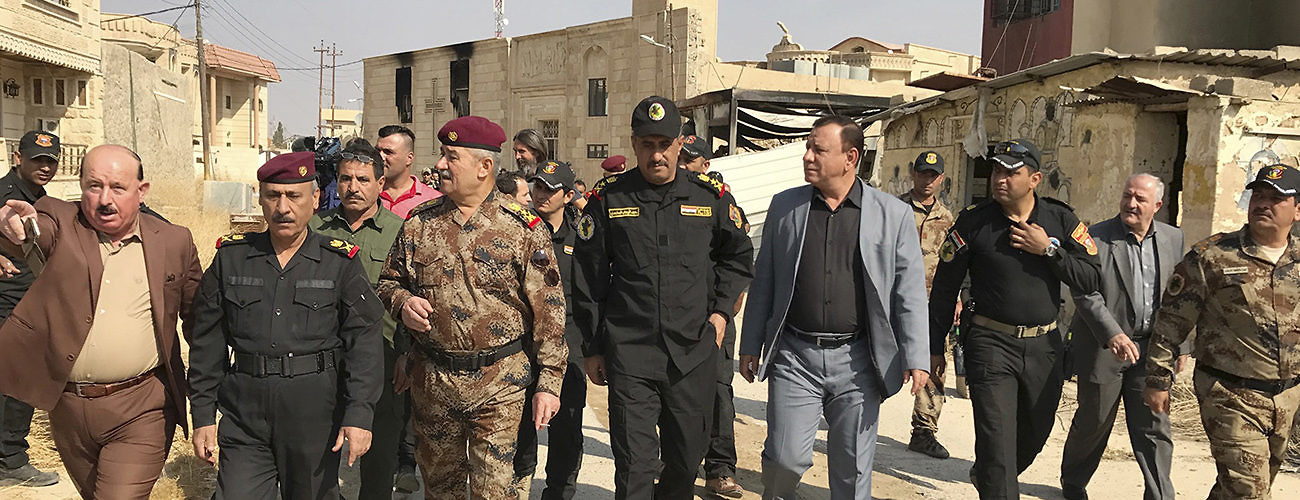Iraqi counterterrorism forces and members of the Mosul Provincial Council tour areas reclaimed from ISIS. Bartella, Iraq, October 26, 2016. (Ali Abdul Hassan/Associated Press)
The battle for Mosul is well underway, with thousands of pro-government forces arrayed around the Islamic State (ISIS)-controlled northern Iraqi city. Initiated on October 17, the battle is a pivotal moment for authorities seeking to re-establish control over territory and expel the extremists, who posed an existential threat to the Iraqi state from mid-2014 to early 2015.
The goal of completely eliminating ISIS and achieving stabilization remains a long way off, however. The group is expected to maintain a significant post-conflict capability and the multiple interests involved in the Middle East will translate into a difficult negotiation process once the group is eventually pushed from Mosul and other urban centers.
ISIS’ 2014 offensive in northern Iraq and capture of territory in nearby Syria seems a long way in the past. The purported caliphate is being challenged from multiple directions and by forces with more resources and expertise. In Syria, ISIS has recently lost Palmyra, the symbolically important Dabiq, and Manbij, a town which connected its Syria stronghold Raqqa to Turkey. In Iraq, its presence in Anbar governorate has been severely degraded with the losses of Ramadi and Fallujah.
If past evidence is anything to go by, ISIS strategists will have planned for recent losses. After the United States military “surge” in Iraq from 2007 to 2011, the group, then known as al-Qaeda in Iraq, went to ground. After the US withdrawal it initiated several year-long armed campaigns, which led to its major 2014 victories. After ISIS loses Mosul it will likely follow a similar tack and, in the longer term, attempt to again expose cleavages in Iraqi society—be they sectarian, political, or ethnic—in an attempt to create conditions for another return.
Ahead of that time, ISIS will seek to harass and slow the advance on Mosul through activity in the immediate theater of conflict and elsewhere in the country. It has already launched two bloody assaults, against Kirkuk between October 21-24, and in Rutba. This has forced pro-government forces to redeploy troops away from the Mosul front.
The involvement of Kurdish fighters in the anti-ISIS coalition poses another dilemma for the central government. After 2014, the Peshmerga and several of its allied fighting groups from Iran, Turkey, and Syria repulsed ISIS assaults on the Kurdistan Regional Government (KRG) autonomous region. They also moved into areas abandoned by the Iraqi army, including the so-called “Kurdish Jerusalem,” Kirkuk.
Currently, the Kurdish force in the north is critical in expelling ISIS; however, the Iraqi government will want disputed territories returned. The Kurd leadership has been adamant in stating that they will not withdraw from disputed territories or cede Kurd-occupied communities to the central government, which includes Kirkuk. Members have also made statements indicating that they could hold a referendum on the KRG’s independence from Iraq. Once the dust settles in Mosul, the central government will look to reclaim lost territory, not only in Ninewa governorate, but also in Diyala and Kirkuk governorates. The Kurds will be in the best negotiation position and may seek to barter with the central government for greater power in the north. As such, Kirkuk could be a sticking point and future source of civil conflict between the Kurds and central government.
Turkey poses another dilemma. The Turkish leadership has a gaze that extends into northern Iraq, which it views as a historical area of influence. Indeed, Mosul was one of the major regional capitals of the Ottoman Empire. Turkey is also seeking to establish a stronger influence over regional events, particularly as it competes with Iran for regional hegemony. A Turkish military presence in northern Iraq and support for moderate Sunni fighters in Syria balances Iran’s proxy forces. Turkey also has its sights set on eliminating Kurdish fighters in southeastern Turkey, including the Kurdistan Workers Party (PKK).
The Iraqi government is well aware that maintaining cordial ties with the KRG and retaining influence among Iraq’s northern Sunni political elite will be critical. It has thus politely declined Turkey’s offers for military assistance in Mosul and called for the Turkish military contingent in Bashiqa to withdraw. It has also targeted pro-Turkey politicians: In mid-October, an Iraqi court issued an arrest warrant for former Ninewa Governor Atheel al-Nujaifi on espionage charges and for allowing the Turkish military to settle in Bashiqa.
Iraq Prime Minister Haider al-Abadi also needs to contend with general discontentment among the Sunni minority. Prior to the 2014 ISIS offensive, Sunni regions had been agitating strongly for greater autonomy akin to that enjoyed by the KRG. This resulted from Sunni perceptions of negative Iranian influence over the Baghdad government and long-held resentment—stemming from past sectarian violence—against the majority Shiite population.
Once ISIS’ urban presence is eliminated, calls for greater Sunni autonomy are likely to strike up again. The government will resist these attempts and seek to reconcile; however, continued Iranian influence over Shiite political and religious leaders, the persistent gaze of Turkey in the north, and continued Kurd agitation for greater independence will motivate Sunnis to persist with demands for a federal Iraq.
The battle against ISIS will be only the first of a series of competitions between domestic and regional powers for control in, and influence over, territory in Iraq. At stake are massive oil reserves, territory—either for room for maneuver or to serve as a buffer—and political prestige. Iraq is unlikely to stabilize after ISIS is defeated in urban areas. Terrorism, conflict, and political instability are expected to characterize the local environment for many years to come.





